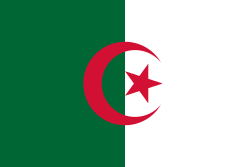| Algeria at the 2015 Summer Universiade | |
|---|---|
 | |
| IOC code | ALG |
| NOC | Algerian Olympic Committee |
| Website | http://www.comiteolympiquealgerien.com/ |
| in Gwangju, South Korea 3 – 14 July 2015 | |
| Competitors | 34 in 3 sports |
| Medals Ranked 50th |
|
| Summer Universiade appearances | |
Algeria participated at the 2015 Summer Universiade in Gwangju, South Korea.
Contents
Since 1963, Algeria has taken part at every Summer World University Games with the exception of 1977 Summer Universiade in Sofia and the 1987 Summer Universiade in Zagreb because of the African boycott.